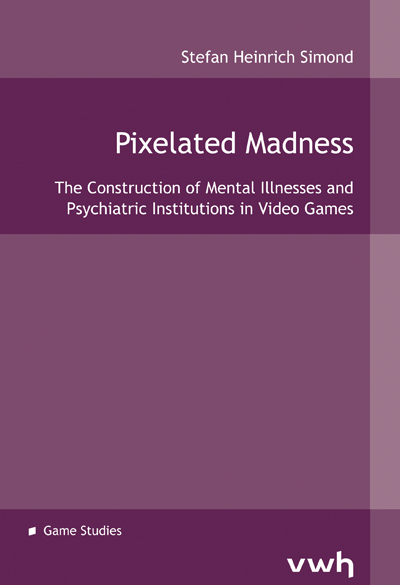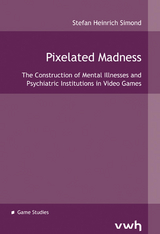Pixelated Madness
The Construction of Mental Illnesses and Psychiatric Institutions in Video Games
Seiten
The relationship between madness and video games has been notoriously tense. In an abundance of titles, stereotypes and stigmatisations can be found—not only regarding the mentally ill, but also psychiatry as a discipline. Sequences of electroshock therapy come to mind, mutated patients, and homicidal maniacs. But where do we go from here? And what lies beyond the criticism of how mental illnesses are portrayed in video games?
In this dissertation, game studies scholar Stefan Heinrich Simond focuses on a small selection of contemporary video games to present detailed qualitative analyses and ultimately develop a typology of madness in video games that can serve as an instructive basis for further study. The primary goal is thereby not to criticise or evaluate but to describe, understand, and disambiguate. From common tropes such as the horror asylum and the animalised inmate to the sanity meter and subversive means of subjectification, a broad angle on madness in video games is presented.
Aside from the concrete analyses, this dissertation also presents a constructivist understanding of madness. Instead of comparing video game characters to diagnostic manuals or therapeutic means to their actual application, video games are taken for what they are: creative expressions that aim to inspire and entertain. Madness in video games is then not considered a mirror to mental illnesses in real life, but a construction in its own right. Based on the presented observations, a new angle on the status of madness in the media might be well warranted.
In this dissertation, game studies scholar Stefan Heinrich Simond focuses on a small selection of contemporary video games to present detailed qualitative analyses and ultimately develop a typology of madness in video games that can serve as an instructive basis for further study. The primary goal is thereby not to criticise or evaluate but to describe, understand, and disambiguate. From common tropes such as the horror asylum and the animalised inmate to the sanity meter and subversive means of subjectification, a broad angle on madness in video games is presented.
Aside from the concrete analyses, this dissertation also presents a constructivist understanding of madness. Instead of comparing video game characters to diagnostic manuals or therapeutic means to their actual application, video games are taken for what they are: creative expressions that aim to inspire and entertain. Madness in video games is then not considered a mirror to mental illnesses in real life, but a construction in its own right. Based on the presented observations, a new angle on the status of madness in the media might be well warranted.
| Erscheinungsdatum | 16.07.2023 |
|---|---|
| Zusatzinfo | zahlr. farb. Abb. |
| Verlagsort | Glückstadt |
| Sprache | englisch |
| Maße | 150 x 220 mm |
| Gewicht | 550 g |
| Themenwelt | Geisteswissenschaften ► Psychologie ► Persönlichkeitsstörungen |
| Informatik ► Software Entwicklung ► Spieleprogrammierung | |
| Sozialwissenschaften ► Kommunikation / Medien ► Medienwissenschaft | |
| Schlagworte | Computerspiele • Computerspielforschung • Game Studies • Psychiatrie • Psychische Erkrankungen • Psychische Störungen • Videospiele • Wahnsinn |
| ISBN-10 | 3-86488-194-3 / 3864881943 |
| ISBN-13 | 978-3-86488-194-7 / 9783864881947 |
| Zustand | Neuware |
| Informationen gemäß Produktsicherheitsverordnung (GPSR) | |
| Haben Sie eine Frage zum Produkt? |
Mehr entdecken
aus dem Bereich
aus dem Bereich
das umfassende Handbuch
Buch | Hardcover (2024)
Rheinwerk (Verlag)
CHF 69,85
Buch | Softcover (2023)
MITP (Verlag)
CHF 34,95




